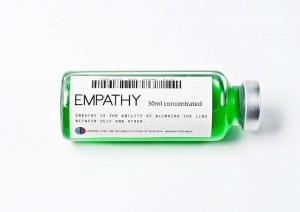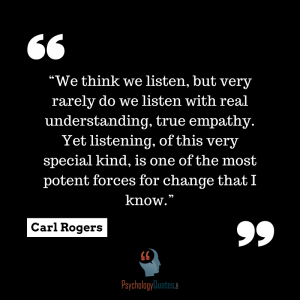Our ability to empathize is key to our success as researchers. To understand the human conditions, social relations, cultural meanings we must first understand and only after that to engage in the conversations of what if. I recently came across a FB post by Kirstie Elgersma. I’ve extracted some parts of her post to illustrate what empathy is and, more importantly, is not:
I recently came across a FB post by Kirstie Elgersma. I’ve extracted some parts of her post to illustrate what empathy is and, more importantly, is not:
A monologue on Empathy:
If someone said to me today,’Holy crap, Kristie. Life freakin’ sucks. I’m so broke. And I feel so scared. I’ve never been this far down before. I don’t know how I’m going to make it…’
– I would rarely say:
‘Well where do you live? I can help you find a job….’
That’s fixing it. And no one needs to be ‘fixed’.
– I would rarely IF EVER say:
‘I think you should figure out your life and get your shit together!’
That’s advising and unless they specifically asked for it, they aren’t needing that from me.
– I would rarely IF EVER say:
‘Ohhh shit! How could you let that happen?!?’
That’s interrogating… And they didn’t come looking for the Spanish Inquisition.
– I would rarely IF EVER say:
‘It’s only that way because you aren’t being positive or you aren’t trying hard enough…. You did this to yourself.’
They aren’t looking for an explanation.
– I would rarely IF EVER say:
‘Hey, you shouldn’t see it that way! There are many things in life to be thankful for.’
That would be me correcting them and they are not needing ‘correction’.
– I would rarely IF EVER say:
‘Well, there is much to be learned from this…’
They don’t need an education on what the fuck is happening to them.
– I would rarely say:
‘None of this is your fault.’
They don’t need me to console them.
– I would rarely IF EVER say:
‘Wellllll if you hadn’t quit that job you had then none if this shit might be happening right now…’
They don’t need me to evaluate their lives. And most people hate hearing,’I told you so’.
– I would rarely say:
‘Those FUCKERZ. The 1%. Fuck I wish they would die so we can all be free.’
They don’t need me to commiserate with them as much as I would want to. That serves no one.
– I would rarely IF EVER say:
‘Oh fuck you think you got it bad! You should hear what happened to this one guy I met… etc etc.’
That’s ‘one upping’ them. They don’t need to hear who has it worse than them. I could imagine that that would make people feel shitty for how they feel or feel shitty that they even shared anything with me in the first place.
– I would rarely say:
‘Hey, that reminds me of the time when I was in my early twenties….’
Telling tales distracts people from what is alive in them. And although that may be a great stall tactic it still serves nothing or no one but my furiously ‘telling tales’ thumbs.
– I would rarely say:
‘Omg! That’s so fucking awful!! I feel so bad for you!! What are you going to do?!?’
They don’t need sympathy from me either. Sympathy can dis-able a person further…..
None of these responses is empathetic, although these responses are frequently confused with empathy. To use our capacity for empathy in research and in everyday life what is called for is to listen, to be curious, to try our very best to understand, and of course to care. Demonstrating empathy is never about telling anyone anything, it is about asking and seeking understanding. This is the first step researchers need to take before presuming they know both what the problem and its solution are.


 Follow
Follow
